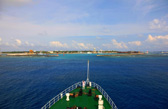Iraq starts 3-day mourning as death toll from car bombings climbs to 166
(Xinhua) Updated: 2016-07-05 09:17The attack happened when many families and young people were in the crowded thoroughfare where many shoppers were preparing their families for Eidul-Fitr scheduled to start on Tuesday, which marks the end of the holy month of Ramadan.
Meanwhile, another car bomb went off in a market in northeastern Baghdad, leaving one dead and five wounded, the source added.
The death toll could rise as many wounded are in critical condition.
The bloody bombings have been claimed by the Islamic State (IS) group which said that one of its suicide bombers detonated his car bomb at a crowd of Shiite people in the predominantly Shiite district of Karrada-Dakhil, according to a statement posted online, which could not be independently verified.
During his visit to the explosion site in Karrada on Sunday morning, Abadi vowed to punish those behind the attacks, according to a statement issued by his office.
"The terrorist groups carried out such desperate deadly attacks as a result of being crushed in the battlefield," the statement said, referring to the government's recent victory of retaking Fallujah city from IS in the country's western province of Anbar.
Abadi also sent his condolences to the families of the victims and promised that "victory over these terrorist groups is very close."
The Iraqi government announced victory of retaking Fallujah, one of the last two strongholds of IS in Iraq, late last month, after almost a month of military operations.
The army is expected to be deployed to the northern Nineveh province, preparing to launch attacks against Mosul city, the country's second biggest city that fell into IS control two years ago.
In a statement issued on Sunday, Iraqi President Fuad Masoum condemned the deadly bomb attacks and called on the security forces to "take urgent measures to totally eliminate the sleeper terrorist cells and arrest the perpetrators."
"The sleeper terrorist cells are seeking to avenge the defeat of terrorist Daesh (IS) in Fallujah and other regions of the country," he said.
The IS has frequently targeted security forces and areas where crowds of people gather, including markets, cafes and mosques, across Iraq.
Observers said there could be more attacks against military targets and civilians in the future as the army advances to the last IS stronghold of Mosul.
Iraq has been hit by a wave of violence since the IS terrorist group seized large parts in Iraq's northern and western regions since 2014.
A report by the United Nations Assistance Mission for Iraq estimated that 662 Iraqis were killed and 1,457 others wounded in acts of terrorism, violence and armed conflict in June this year across Iraq.
- Twin assaults in Syria, Iraq pile pressure on IS
- Experts: Ancient sites not exposed to risk as in Syria, Iraq
- Series of IS bombing attacks kill more than 90 in Iraq's capital
- At least 7 killed in car bomb attack in Iraq's Baghdad
- Hillary Clinton calls voting for Iraq war 'a mistake'
- UN chief to help Iraq overcome financial crisis, fight IS







